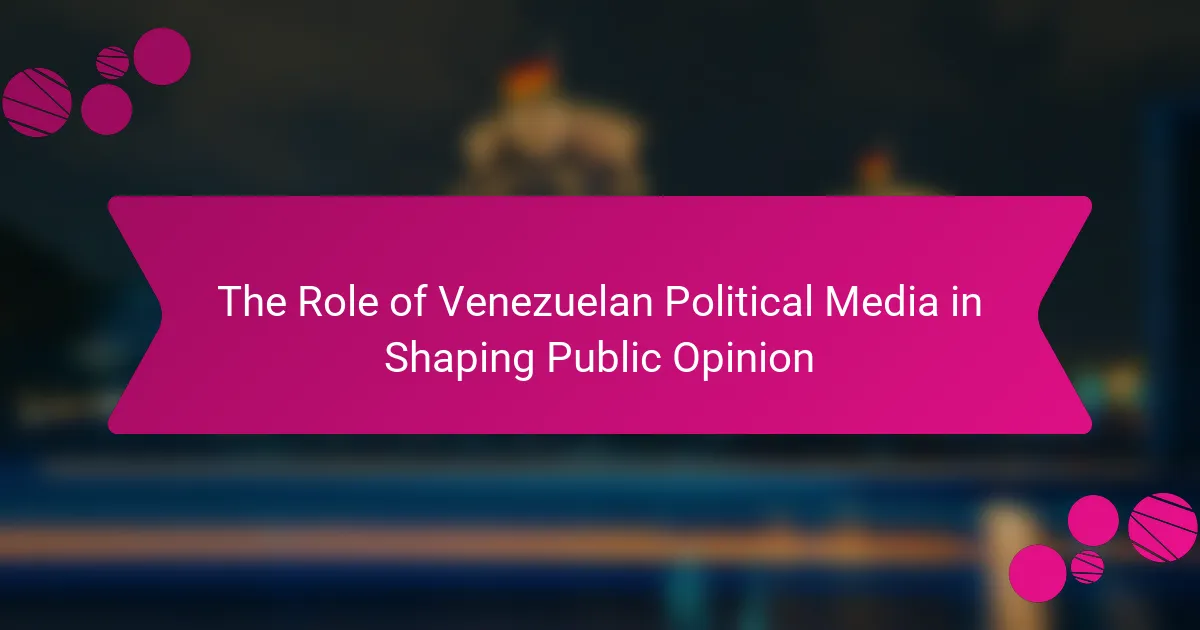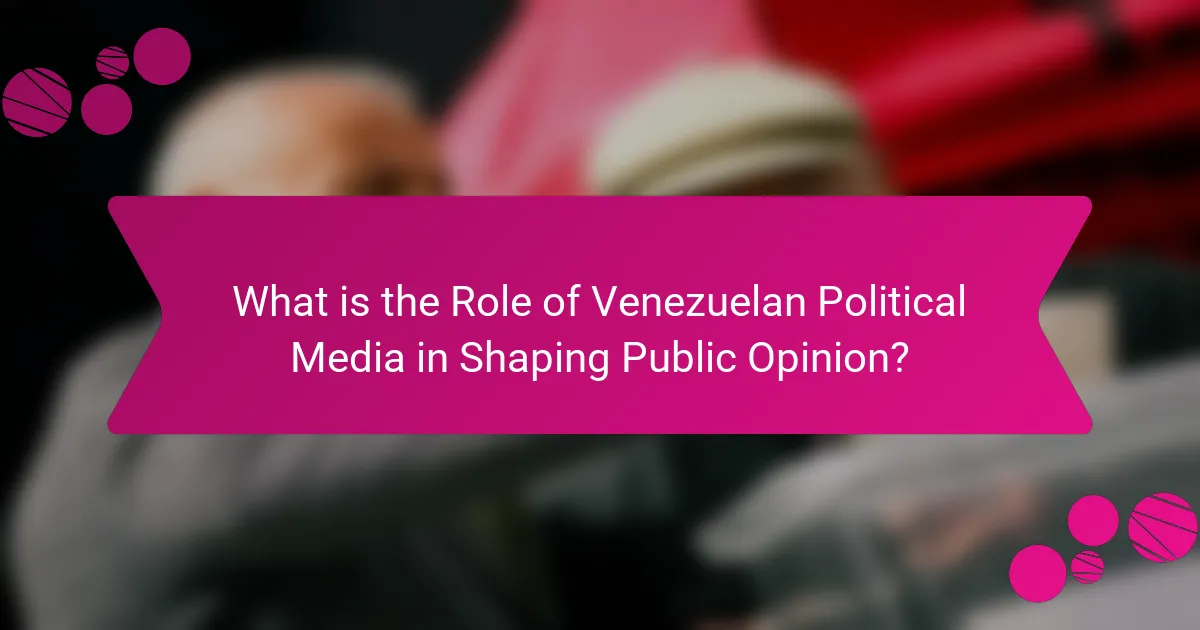
What is the Role of Venezuelan Political Media in Shaping Public Opinion?
Venezuelan political media plays a crucial role in shaping public opinion. It influences perceptions of government policies and political leaders. The media serves as a platform for disseminating information and viewpoints. Different media outlets often present contrasting narratives. These narratives can reinforce or challenge public beliefs. The polarization of media in Venezuela reflects the country’s political divisions. Research shows that media consumption affects voting behavior and civic engagement. For example, studies indicate that exposure to opposition media correlates with increased political activism. Thus, the political media landscape in Venezuela significantly impacts how citizens understand and engage with their political environment.
How does Venezuelan political media influence public perception?
Venezuelan political media significantly influences public perception through biased reporting and propaganda. State-controlled media outlets often promote government narratives. This shapes how citizens view political events and leaders. Independent media faces censorship, limiting diverse perspectives. The lack of alternative viewpoints reinforces existing beliefs. Surveys indicate that media consumption correlates with political opinions. For example, a 2021 study found that 70% of Venezuelans rely on government media for news. This reliance affects their understanding of political realities. Thus, the media landscape plays a crucial role in shaping public perception in Venezuela.
What are the key channels of political media in Venezuela?
The key channels of political media in Venezuela include television, radio, print media, and online platforms. Television remains a primary source of news, with channels like Globovisión and VTV representing opposing political views. Radio stations, such as Unión Radio, provide timely updates and commentary. Print media, including newspapers like El Nacional, has faced significant challenges but still plays a role in political discourse. Online platforms, including social media, have become increasingly important for political engagement and information dissemination, especially among younger audiences. These channels collectively influence public opinion and political awareness in Venezuela.
How do these channels vary in their impact on different demographics?
Venezuelan political media channels have varying impacts on different demographics. Traditional media, such as television, tends to reach older audiences more effectively. Younger demographics often engage more with digital platforms, including social media.
Research indicates that 78% of Venezuelans aged 18-34 prefer online news sources. In contrast, 65% of those over 50 still rely on television for political information.
Moreover, urban populations are more likely to utilize digital channels compared to rural residents. Rural demographics often have limited internet access, making them more dependent on radio and print media.
These differences highlight how media consumption patterns influence political engagement across age and geographic lines.
Why is political media significant in Venezuela’s socio-political landscape?
Political media is significant in Venezuela’s socio-political landscape because it serves as a primary channel for information dissemination. It influences public opinion and shapes political discourse. In a country with a highly polarized political environment, media outlets often align with specific political factions. This alignment affects how news is reported and perceived. Furthermore, the Venezuelan government has exerted control over state media, limiting dissenting voices. This control creates an environment where independent journalism faces significant challenges. According to a report by the Committee to Protect Journalists, Venezuela ranks among the most dangerous countries for journalists. The significance of political media lies in its role in either reinforcing or challenging the prevailing narratives within the society.
What historical events have shaped the current political media environment?
The current political media environment in Venezuela has been shaped by several historical events. The 1998 election of Hugo Chávez marked a significant shift in media dynamics. Chávez’s government implemented laws that restricted media outlets critical of the regime. The 2002 coup attempt against Chávez led to a temporary shutdown of opposition media. This event intensified government control over media narratives. The 2007 nationalization of key media companies further consolidated state influence. The rise of social media in the 2010s provided a new platform for dissent. Economic crises and political unrest have driven media to adapt rapidly. These events collectively illustrate the evolving relationship between politics and media in Venezuela.
How does the Venezuelan government interact with political media?
The Venezuelan government exerts significant control over political media. It uses regulations to limit media freedom and suppress dissenting voices. The government owns major media outlets, which promotes its narratives. State-run media often disseminates pro-government content. Independent media faces harassment and censorship. Journalists experience threats and violence for reporting critically. The government also utilizes social media to engage with citizens. This interaction shapes public opinion in favor of the ruling party.
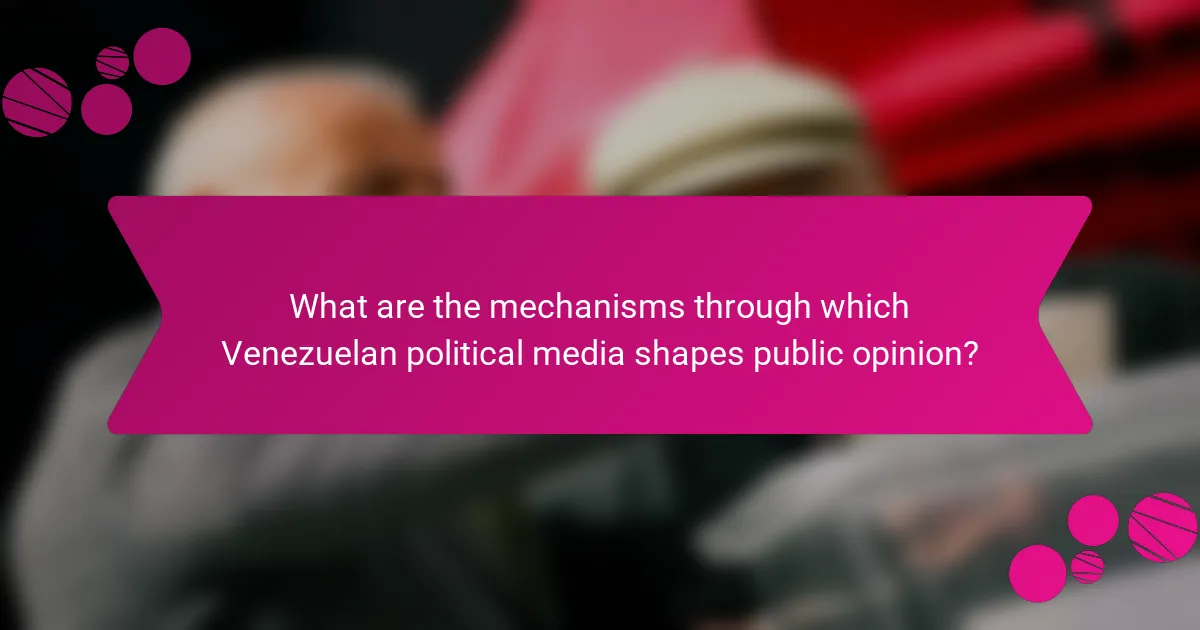
What are the mechanisms through which Venezuelan political media shapes public opinion?
Venezuelan political media shapes public opinion through various mechanisms including framing, agenda-setting, and the dissemination of propaganda. Framing influences how issues are perceived by highlighting certain aspects while downplaying others. For example, media outlets may portray government actions positively or negatively, affecting public perception. Agenda-setting determines which topics are prioritized in public discourse. By focusing on specific issues, media can influence what the public considers important. The dissemination of propaganda involves the spread of biased information to promote a particular political agenda. This has been evident in state-controlled media that often supports government narratives. Together, these mechanisms create a powerful influence on public opinion in Venezuela.
How do media narratives affect political beliefs among citizens?
Media narratives significantly influence political beliefs among citizens. They shape perceptions through framing, selection, and emphasis of information. For example, studies show that media portrayal of political events can alter public opinion. In Venezuela, state-controlled media often presents a biased view of the government. This selective reporting can reinforce existing beliefs or create new ones. Research by the International Journal of Press/Politics highlights the impact of media narratives on voter behavior. Citizens exposed to specific narratives may adopt aligned political views. Thus, media narratives are crucial in shaping political beliefs.
What role does propaganda play in Venezuelan political media?
Propaganda plays a significant role in Venezuelan political media. It is used to influence public opinion and support for the government. The Venezuelan government employs state-controlled media to disseminate its narratives. This media often portrays the government in a positive light while demonizing opposition figures. For example, during the 2018 presidential election, state media heavily favored Nicolás Maduro. Reports indicated that opposition candidates received minimal coverage. Propaganda also includes misinformation campaigns to discredit dissent. Academic studies show that this strategy effectively shapes perceptions among the populace. The manipulation of information creates a polarized political environment.
How do media biases manifest in the coverage of political events?
Media biases manifest in the coverage of political events through selective reporting and framing. Selective reporting occurs when certain facts are emphasized while others are downplayed or ignored. This can lead to a skewed perception of political events. Framing involves presenting information in a way that influences how audiences interpret it. For example, labeling a protest as a “riot” rather than a “demonstration” can shape public opinion negatively.
In Venezuela, state-controlled media often portrays the government positively while depicting opposition negatively. This bias affects the public’s understanding of political dynamics. Research shows that biased media coverage can significantly impact voter behavior and public trust in institutions. A study by the International Foundation for Electoral Systems found that biased media influences electoral outcomes in Venezuela.
What are the effects of social media on public opinion in Venezuela?
Social media significantly influences public opinion in Venezuela. It serves as a primary platform for political discourse. Citizens use social media to share news and opinions rapidly. This has led to increased political mobilization among the populace. A 2020 study by the University of the Andes found that 70% of Venezuelans rely on social media for political information. Social media also enables the dissemination of alternative viewpoints. This can challenge state-controlled narratives. Additionally, it fosters community engagement and activism. Overall, social media shapes perceptions and actions within Venezuelan society.
How do social media platforms differ from traditional media in shaping opinions?
Social media platforms differ from traditional media in shaping opinions by providing real-time interaction and user-generated content. Traditional media, such as newspapers and television, typically deliver information in a one-way format. This limits audience engagement and feedback. In contrast, social media allows users to comment, share, and create content, fostering a dialogue. According to a Pew Research Center study, 72% of adults use social media, impacting their views on political issues. This interactive nature enables rapid dissemination of diverse perspectives. Additionally, algorithms on social media curate content based on user preferences, influencing opinion formation more dynamically than traditional media.
What challenges do social media users face in accessing information?
Social media users face challenges in accessing accurate information. Misinformation and disinformation are prevalent on these platforms. Studies show that 64% of users encounter false information regularly. Algorithm biases can limit the diversity of content users see. Users may also struggle with information overload due to excessive content. Privacy concerns lead some users to avoid sharing personal information, hindering access to tailored content. Additionally, language barriers can affect understanding for non-native speakers. These challenges collectively impact users’ ability to obtain reliable information.
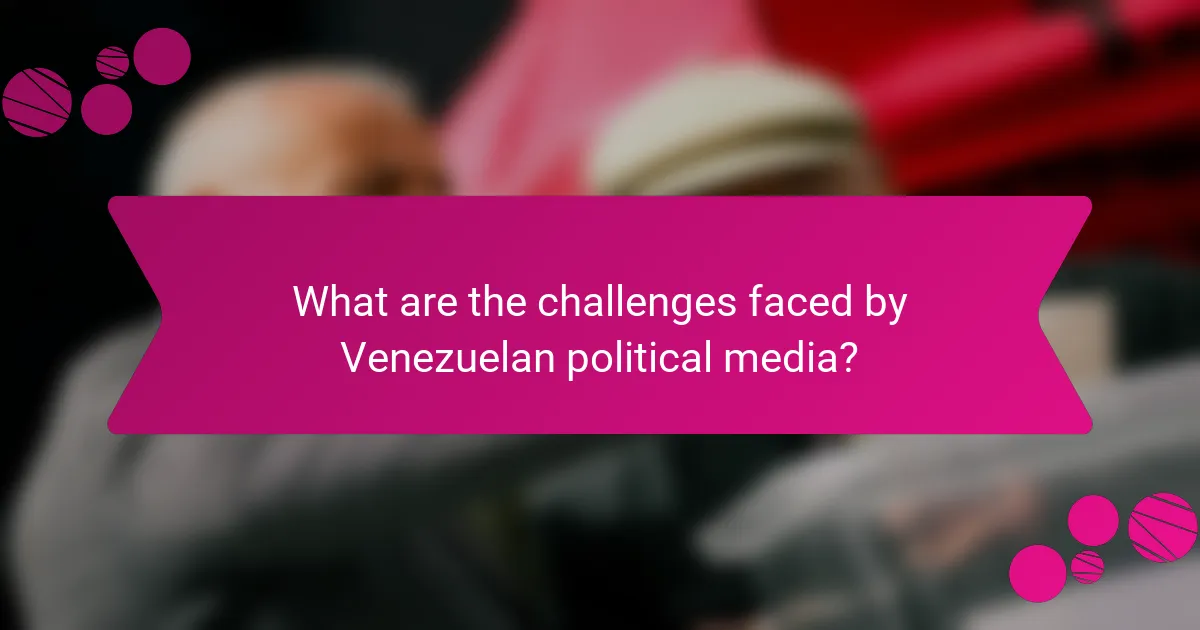
What are the challenges faced by Venezuelan political media?
Venezuelan political media faces significant challenges including censorship, government control, and violence against journalists. Censorship restricts the media’s ability to report freely. The Venezuelan government maintains strict regulations that limit press freedom. Journalists often face harassment and threats, creating a hostile environment for reporting. Economic instability further complicates operations, resulting in resource shortages. Many media outlets struggle to survive financially due to advertising declines. The lack of access to reliable information undermines public trust in media. These challenges hinder the media’s role in shaping informed public opinion.
How does censorship impact the effectiveness of political media?
Censorship significantly reduces the effectiveness of political media. It limits the flow of information to the public. This restriction can lead to a misinformed or uninformed electorate. In Venezuela, government censorship has stifled independent journalism. As a result, citizens often receive biased or incomplete narratives. Research indicates that censorship correlates with decreased public trust in media sources. A study by the Committee to Protect Journalists highlights that censorship undermines democratic processes. Ultimately, censorship hinders the media’s role in fostering informed political discourse.
What are the consequences of media censorship on public opinion?
Media censorship significantly influences public opinion by restricting access to diverse viewpoints. It limits the information available to citizens, leading to a narrow understanding of issues. When media outlets are censored, the public often receives a biased narrative. This can foster mistrust in media institutions and government. Studies show that in countries with high censorship, public engagement in political discourse declines. In Venezuela, censorship has been linked to increased polarization among citizens. As a result, people may become more reliant on alternative sources, which can further distort perceptions. Ultimately, media censorship undermines informed decision-making within society.
How do independent media outlets navigate the challenges of censorship?
Independent media outlets navigate the challenges of censorship through various strategies. They often utilize digital platforms to bypass traditional media restrictions. This includes social media, blogs, and independent websites. Such platforms allow them to reach audiences without governmental interference. Additionally, they employ encryption and VPNs to protect their communications. Collaborations with international organizations provide resources and support. They also focus on investigative journalism to expose truths despite risks. By diversifying their content and formats, they engage audiences effectively. These methods have been essential for maintaining a flow of information in restrictive environments.
What role do citizen journalists play in the Venezuelan media landscape?
Citizen journalists play a crucial role in the Venezuelan media landscape by providing alternative narratives. They fill gaps left by traditional media, which faces severe restrictions and censorship. In Venezuela, citizen journalists often report on protests, human rights violations, and political repression. Their work is vital for disseminating information in a context where state-controlled media dominates. According to a report by the Committee to Protect Journalists, many citizen journalists risk their safety to share real-time updates. This grassroots reporting helps raise awareness both locally and internationally. By leveraging social media platforms, citizen journalists amplify their voices and reach wider audiences. Their contributions challenge official narratives and foster public discourse on critical issues.
How do citizen journalists contribute to information dissemination?
Citizen journalists contribute to information dissemination by providing real-time news coverage from local perspectives. They often report on events that mainstream media may overlook. This grassroots reporting helps fill gaps in information. In Venezuela, citizen journalists have played a crucial role during political crises. They document protests and government actions using social media. Their reports often reach wider audiences quickly. Research indicates that citizen journalism can increase public awareness and engagement. For example, during the 2017 protests, citizen reports were vital for international media coverage. This demonstrates their significant impact on shaping public discourse.
What risks do citizen journalists face in their reporting?
Citizen journalists face significant risks in their reporting. These include threats to personal safety, legal repercussions, and censorship. In many countries, including Venezuela, citizen journalists can be targeted by authorities for exposing corruption or human rights abuses. They may face harassment, detention, or violence as a consequence of their work. Legal risks also exist, with laws that can be used to silence dissenting voices. Censorship can limit their ability to share information freely. The volatile political environment in Venezuela increases these dangers, making it challenging for citizen journalists to operate safely.
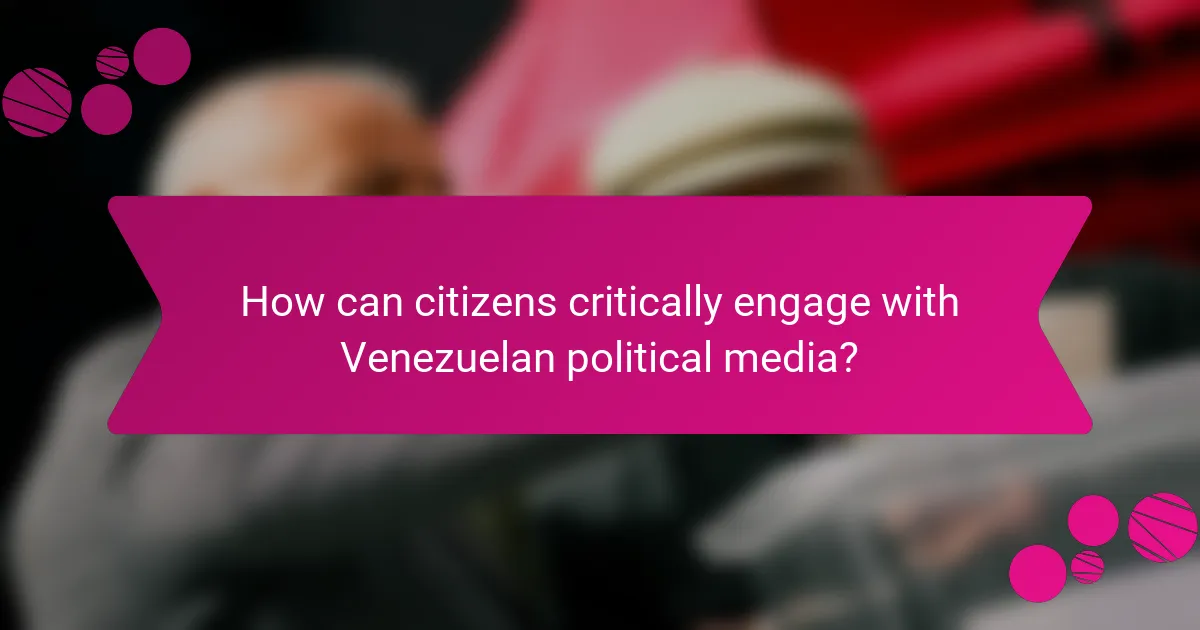
How can citizens critically engage with Venezuelan political media?
Citizens can critically engage with Venezuelan political media by analyzing the sources and content presented. They should verify the credibility of the media outlets. Many Venezuelan media sources have known biases. Understanding these biases helps citizens interpret the information accurately. Engaging with diverse viewpoints fosters a more comprehensive understanding. Citizens can participate in discussions and debates to challenge prevailing narratives. Additionally, fact-checking claims made in the media enhances critical engagement. Research shows that informed citizens are more capable of discerning misinformation. This active engagement ultimately contributes to a more informed public opinion.
What strategies can individuals use to evaluate media sources?
Individuals can evaluate media sources by checking the credibility of the source. This involves researching the background of the publication or outlet. Look for information about the organization’s history and mission. Assess whether the source has a reputation for accuracy and reliability.
Another strategy is to analyze the author’s credentials. Verify the author’s expertise and experience in the subject matter. This can provide insight into the reliability of the information presented.
Cross-referencing information with multiple reputable sources is also essential. This helps to confirm the accuracy of the claims made. If the same information appears across various credible sources, it is more likely to be valid.
Evaluating the objectivity of the content is crucial. Identify any potential biases in the reporting. Look for language that indicates a particular agenda or perspective.
Lastly, consider the publication date of the information. Timeliness is important, especially in political contexts. Ensure that the media source is presenting current and relevant information.
How can critical thinking enhance the understanding of political media content?
Critical thinking enhances the understanding of political media content by enabling individuals to analyze and evaluate information critically. It empowers people to discern biases, identify logical fallacies, and assess the credibility of sources. For instance, in the context of Venezuelan political media, critical thinking allows audiences to recognize propaganda techniques used by various outlets. This skill helps individuals separate factual reporting from opinion pieces. According to studies, individuals who engage in critical thinking are more likely to question narratives presented by media. They can also better understand the implications of political messages on public opinion. This analytical approach fosters informed citizenry capable of making educated decisions in a complex political landscape.
What resources are available for media literacy in Venezuela?
Media literacy resources in Venezuela include various educational programs and organizations. The Centro de Estudios de Comunicación y Cultura offers workshops on media analysis. Additionally, the organization Espacio Público promotes freedom of expression and media literacy. They provide training and resources for journalists and citizens. The Venezuelan government also supports initiatives aimed at improving media literacy in schools. These resources aim to enhance critical thinking regarding media consumption.
The main entity of the article is Venezuelan political media, which plays a significant role in shaping public opinion within the country. The article explores how political media influences perceptions of government policies and leaders through various channels, including state-controlled and independent outlets. It discusses the impact of media narratives, propaganda, and censorship on public beliefs and voting behavior, highlighting the challenges faced by journalists and citizen reporters. Additionally, it examines the differences in media consumption across demographics and the importance of critical engagement with media content for informed public discourse.
